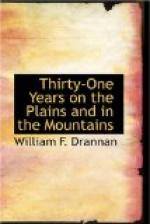Having disposed of all our blankets, beads and all of the tobacco, except what was reserved for home consumption, we left Bent’s Fort, crossed the Arkansas river and followed up Apishapa creek three days, when we came to the Rocky Mountains, among which we were during four days, passing Trinkara Peak then turning south toward a little Mexican village called Taos, where Uncle Kit made his home, he having a house of his own in that village.
On the morning after our arrival at Taos, Uncle Kit said to me at breakfast:
“Willie, there are a lot of Mexican boys here who would like to play with you.”
Some of them were standing near in a group, gazing at me in much wonderment.
“But,” continued Uncle Kit, “you will have to learn to speak their language in order to have much fun. Go with them if you wish, and tell me to-night how many words you have learned.”
Then he spoke to the group of boys in their own tongue and told them I wished to play with them but couldn’t speak their language, and wanted to learn.
We had a jolly time that day in many boyish games that I had never seen, and when I came home Uncle Kit asked me how many words I had learned.
“Three,” I replied.
“Splendid!” he exclaimed. “‘Twont be long fo’ you are a fus’-class Mexican.”
One evening, after we had been in Taos about two weeks, Uncle Kit told me to put on my best suit and he would take me to a fandango. I was not sure what a fandango was but was willing to experience one, just the same, and, togged out in our best, we went to the fandango, which was simply a Mexican dance. Sort of a public ball.
I looked on that night with much interest, but declined to participate further than that. I learned better in a little while, and the fandango, with the tinkle of guitars and mandolins, the clink of the cavalleros’ spurs, and the laugh and beauty of the Mexican senoritas, became a great pleasure to me.
Thus began our life at the little Mexican town of Taos, the home of that great hero of the West, Kit Carson.
CHAPTER III.
Hunting and trapping in south park, where A boy, unaided, kills and scalps two Indians—meeting with Fremont, the “Path-finder.”
One evening in October as I was getting ready to retire for the night, Uncle Kit said to me:
“Now Willie, to-morrow you must put in the day moulding bullets, for we must begin making preparations to go trapping.”
This was pleasant news to me, for I had laid around so long with nothing to do but skylark with those Mexican boys, that life was getting to be monotonous.




